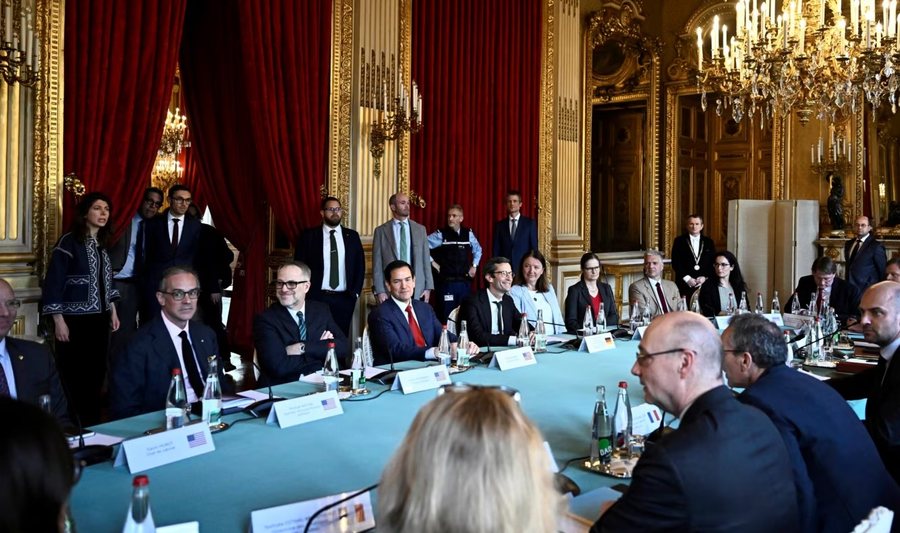
There has recently been talk of a ceasefire in Ukraine by Easter. That has not happened, but there may have been tangible progress in diplomatic efforts that could raise hope this weekend.
The voices emerging from Paris after high-level talks between key European countries, Ukraine, and the United States have been overwhelmingly positive.
This was the first meeting between them in such a format, and in many ways the signals were not good, A2 reports.
US efforts to convince Russia to accept some kind of ceasefire have been met with vague statements and increased bombing from Moscow.
US special envoy Steve Witkoff said a deal was "coming" after his third meeting with Russian President Vladimir Putin on April 11, hinting that Ukraine must make major territorial concessions to Russia.
In Kiev, Ukrainian President Volodymyr Zelensky accused Witkoff of "spreading Russian narratives."
No cameras, please.
In Paris, a 45-second video was released showing Emmanuel Bonne, a senior French adviser, appearing to ask Steve Witkoff to begin the proceedings with a summary before the cameramen were hurried away by security teams.
It seemed like they wanted to get the cameras away before they said anything.
"It is perfectly clear that most European leaders, including [French President Emmanuel] Macron, are completely against all the proposals made, especially by Steve Witkoff," French political analyst Nicolas Tenzer told Radio Free Europe.
But Tenzer, who heads the Center for Studies and Research on Political Decision-Making (CERAP), a Paris-based institute, added that just holding this meeting is a sign of progress.
"Now they are realizing that they cannot reach any kind of agreement without the Europeans," he said.
No agreement on Ukraine was announced after the meeting. But the parties agreed to hold new talks next week in London, with a new format: Europe, Ukraine and the US. And this seems to be an important development.
A day after the meeting in Paris, US Secretary of State Marco Rubio said that the talks in Paris were constructive and resulted in a summary of steps towards peace.
Rubio said Friday that he hopes Europeans will remain engaged in U.S.-led talks toward a ceasefire in Ukraine.
"We would like them to remain engaged... I think the United Kingdom, France and Germany can help us move this issue towards a resolution. I think they were very helpful and very constructive in their ideas," Rubio told reporters.
He also said the US could withdraw from efforts to reach a peace agreement between Russia and Ukraine if progress is not made quickly.
"We are not going to continue this effort for weeks or months. We need to determine very quickly, and when I say very quickly, I mean a matter of days, whether this [reaching an agreement] is feasible in the coming weeks. If that happens, then we are in the process. If not, then we have other priorities to focus on as well," declared the US chief diplomat.
A seat at the table
Also present at the Paris talks was US envoy Keith Kellogg, who in February in Munich had declared that Europe would have no seat at the table when negotiating the future of Ukraine. Since then, Kellogg has largely been absent from important meetings.
"'E3' is on the table and we are doing this with a European ambition," said a French diplomat, referring to Britain, France and Germany, known as the "E3" group.
Alina Polyakova, president of the Center for European Policy Analysis (CEPA) in Washington, also said that the meeting in Paris suggests that Washington is now seeking support from Europe.
"They understood that European contribution is needed because they also have direct interests in this situation," she said.
"This is not just about a piece of territory in Ukraine. This is related to the broader issue of European security, and you can't separate the two."
There were also diplomatic developments in other countries.
As leaders gathered in Paris, US President Donald Trump hosted Italian Prime Minister Giorgia Meloni at the White House.
He said there could be two more developments in the coming days: an agreement with Ukraine to give the United States access to its rare minerals and a response from Russia to a possible ceasefire in Ukraine.
In both cases, previous optimistic statements by American officials have not borne fruit.
But the possibility of a new diplomatic path involving Europe, Ukraine and the United States is indeed new. The question now is whether the announced meeting in London will be the start of a new and productive diplomatic process – or simply another dead end./ REL (A2 Televizion)











